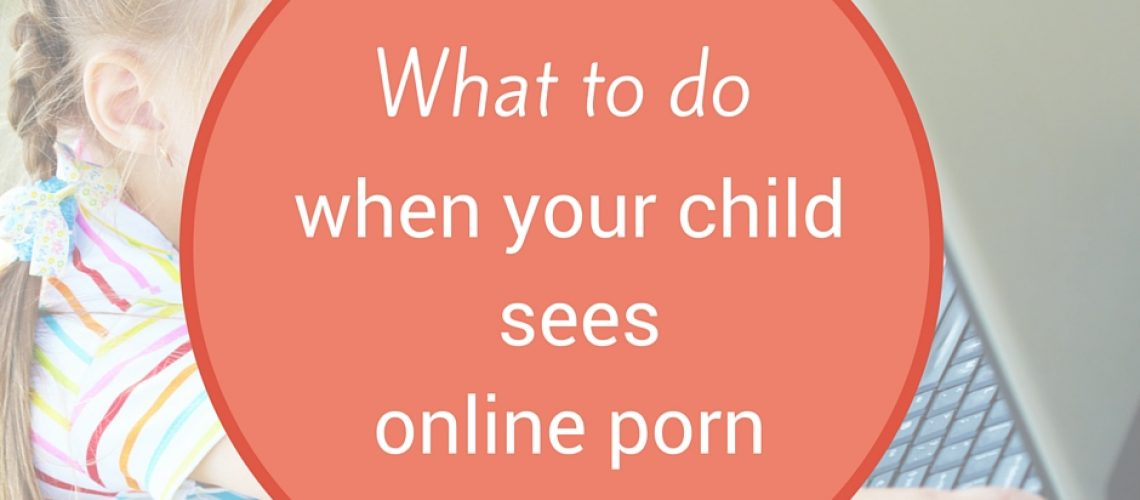Will you know what to do when your child sees online porn? Think your don’t need to know? Last week we decided that it was highly likely your child will view online pornography, either by accident, curiosity, or an older sibling or friend. We also came to the conclusions that the pornography our children are likely viewing is often very hard core, sometimes violent in nature, often involving and imbalance of power and basically not at all reflective of how we want them to view their sexuality and their intimate relationships.
It’s all a bit yuck really. Quite awkward and something many of us wish would just go away. But despite our best efforts, the research tells us this is something that we need to address despite our deep desire to bury our head deep in the sand.
Once again I have enlisted the help of youth sexuality expert Liz Walker to help us learn more about how we can best address this with our kids and what we need to do when we suspect our child has seen online porn.
What should parents be doing if they suspect their child has been exposed to porn?
Listen. Talk. Deconstruct. It’s really important that parents don’t over react as this potentially leaves kids with the impression that by viewing porn it somehow makes them ‘dirty’. Yet it’s equally important they recognise porn is not a good impression of healthy sexuality or relationships. If it’s a once-off ‘sneak-peak’, it would be best to use this as an opportunity to have an open conversation. They may be feeling a whole range of things, including sick in the tummy, yuck, disgusted, repulsed or upset. They also may be aroused by the material, yet perhaps at the same time, know that this is something they shouldn’t be looking at. It can be a very confusing time – more so if they try to process it in their own head. It’s important for kids to feel as though they can talk about it without fear of reprimand. A great pre–tween book for parents to read with their kids to give them a grounding in what pornography is, what it can do to the brain and how to avoid it is: Good Pictures, Bad Pictures.
What about when kids are actively searching for it? How should parents be dealing with this?
When kids are actively searching for pornography, parents would be well advised to seek professional counselling or specialist support. Initially the support may be for the parent to know how to process their child’s engagement with explicit content. We know that children who regularly seek out pornography is seen as an ‘orange’ or ‘red’ flag activity that needs intervention, as it can potentially disrupt healthy sexual development, attitudes towards themselves and others, and in some cases can lead to risky behaviour or inappropriate interaction with other children. Intervention from a professional service can help both parent and child to understand what’s going on, how it is affecting development, and redirect the behaviour. Monitoring or accountability software may be part of the solution, preferably with the guidance and support of a counsellor, psychologist or specialist clinic. A good video to help teens understand the pathway to compulsive use is called ‘The Science of Pornography Addiction’. https://youtu.be/1Ya67aLaaCc
Any other tips for parents? Schools? kids?
Youth Wellbeing Project’s survey also showed that parents are feeling unsupported by their schools. Less than 10% indicated their child’s school provides age-appropriate relationships and sexuality education curriculum that covers access and exposure to pornography. Not one respondent indicated that their school provides them with support to speak with their children about pornography. And less than 30% indicated that their kids had been taught body safety. Parents need to encourage schools to partner with them. The schools we are in contact with are fearful about being perceived as having an ‘issue’ with porn use. The reality is that porn is everywhere. Attitudes and behaviours in children and young people are influenced by pornography, including young people’s engagement in ‘risky behaviour’. Collectively, parents and schools need to work together to support children to have an alternative view of relationships and sexuality than what pornography provides.
I also heard you say once about using the metaphor for a hollywood movie about fast cars etc? could you just give a quick overview of that too?
If parents are looking for a good metaphor, perhaps use something like the ‘Fast & the Furious’ movie series. These cars are hotted up, with engines that are built to travel at incredibly fast speeds. They zip through streets, launch off bridges and fly between buildings, often crashing and burning. This is not real life. Most drivers don’t have cars like that. Most drivers don’t drive like that. It’s unsafe for everyone involved to even try. Similarly, porn actors and actresses are hotted up. What they perform is an unrealistic and distorted picture of the real world. The size and shape of body parts are often modified or enhanced to suit the job description. Porn stars are paid to perform the unrealistic, doing things that often lead them to emotionally and psychologically ‘crash and burn’, more so if women and children are forced into the industry through human trafficking. Unlike the ‘Fast & the Furious’ movies that can simply be watched for entertainment, the harms of the porn industry are often not realised until the lives of individuals, relationships and families face the clean up.
So it seems communication needs to again be key. Its about having those awkward conversations about what htye may have seen, differentiating between fantasy and reality as well as expectations, self worth, respect for self and others.

